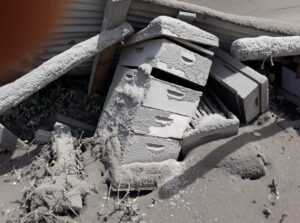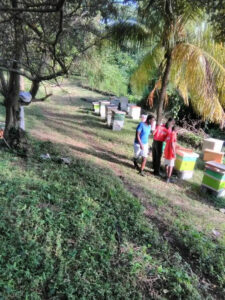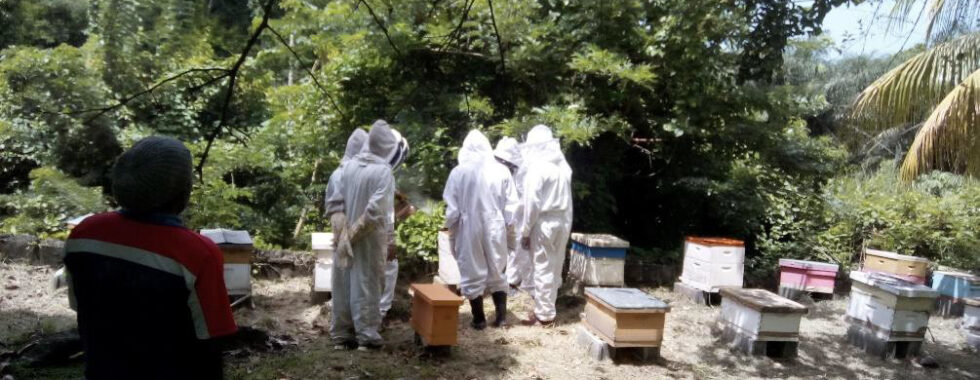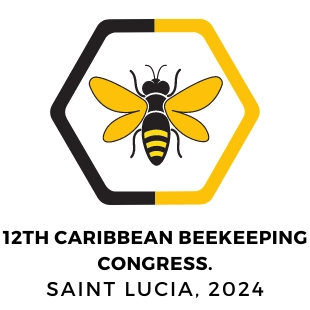The 11th CBC – “Building the Resilience of a Beekeeping Industry after a Natural Disaster.”
 The Ministry of Agriculture is working in collaboration with the SVG Beekeepers Association Inc. (SVGBA will host the 11th Caribbean Beekeeping Congress during October 30th – November 2nd, 2022, under the theme: “Building the Resilience of a Beekeeping Industry after a Natural Disaster.” This event therefore stages a catalyst for launching apiculture initiatives. The training provides technical exposure to all our beekeepers and beekeeping prospects, and the wider community as to the importance of bees to our food industry. It entails opportunities for new alternative livelihoods and an introduction to a farming practice that complements the ecosystem.
The Ministry of Agriculture is working in collaboration with the SVG Beekeepers Association Inc. (SVGBA will host the 11th Caribbean Beekeeping Congress during October 30th – November 2nd, 2022, under the theme: “Building the Resilience of a Beekeeping Industry after a Natural Disaster.” This event therefore stages a catalyst for launching apiculture initiatives. The training provides technical exposure to all our beekeepers and beekeeping prospects, and the wider community as to the importance of bees to our food industry. It entails opportunities for new alternative livelihoods and an introduction to a farming practice that complements the ecosystem.
The Caribbean Beekeeping Congress (CBC) is held in the Caribbean every two years, with St. Lucia being the last host. It is an event promoted by the Association of Caribbean Beekeepers’ Organizations (ACBO) based in Trinidad and Tobago of which SVGBA became a member since the 6th Caribbean Beekeeping Congress which was held in Grenada in 2011. Mr. Gladstone Solomon the founding President of ACBO, who after attended the 35th congress of the International Federation of Beekeepers’ Associations (Apimondia) in Switzerland during 1995, became so impressed by the overall learning experience, he saw it fit to replicate a similar event in the region. That is, enabling opportunities for his regional colleagues to have similar experiences. And so, the first congress was held in Tobago in November 1998, where Mr. Solomon resided.
The Ministry of Agriculture, Extension and Advisory Services (EAS) have been working closely with the SVGBA in which Agriculture Instructor – Mr. Allan Williams have been assigned since its inception. It has been a thriving beekeeping farmers group since 2006. The SVGBA became formally registered in 2012 as is a not-for-profit farmers’ organization that arbitrates firstly for the interest of its members and by extension, the growth and sustainability of local beekeeping. It is carefully run by a 7-member executive board with a current 34 registered membership. The executive meets once per month and an annual general meeting being held since its inception, except during the recent period of the Covid-19 pandemic. It has since been led by three presidents and currently being led by a female beekeeper.
The Extension and Advisory Services provided firm technical support to the SVGBA through project development which ensured that honeybees evidently remain part of the ecosystem in almost all the major inhabited Grenadine Islands in SVG – from Bequiato Union Island (with the exception of Cananoun to date). Reviving the beekeeping industry was the first goal accomplished since 2006. Honeybees were totally wiped out in Bequia during 2006 and there were only 26 domesticated hives on the mainland due to a pest called the Varroa Mite (Varroa jacobsoni). Some notable mentions of technical support provided to the SVGBA were: importation of honeybees and hybrid queens, providing starter kits for beekeepers to restart their beekeeping enterprises, local queen rearing and bee breeding on surviving apiaries on the mainland, conducting various beekeeping training courses, and conducting hives inspection through apiary visits.
 One major success story that resulted in the technical support to the SVGBA was introducing honeybees to Union Island (Southern Grenadines) in July 2006. Union Island was a virgin territory for honeybees. Hence, the location was used as an opportunity for preserving the local Italian specie in the event-crossing of Africanized honeybee species should there be such an invasion via our ever-vulnerable ports of entry. Honeybees were successfully introduced to Union Island for the purpose of future queen rearing or bee breeding programs. Residents were trained in beekeeping where a new livelihood was introduced and practiced in Union Island. Two apiaries were set up in the mangrove swamp at the Ashton Lagoon in Union Island. Swarms migrated to the neighboring Grenadine isles: Mayreau and Palm Island enhancing the ecosystem of these environments and the honey produced in these areas are of a unique quality.
One major success story that resulted in the technical support to the SVGBA was introducing honeybees to Union Island (Southern Grenadines) in July 2006. Union Island was a virgin territory for honeybees. Hence, the location was used as an opportunity for preserving the local Italian specie in the event-crossing of Africanized honeybee species should there be such an invasion via our ever-vulnerable ports of entry. Honeybees were successfully introduced to Union Island for the purpose of future queen rearing or bee breeding programs. Residents were trained in beekeeping where a new livelihood was introduced and practiced in Union Island. Two apiaries were set up in the mangrove swamp at the Ashton Lagoon in Union Island. Swarms migrated to the neighboring Grenadine isles: Mayreau and Palm Island enhancing the ecosystem of these environments and the honey produced in these areas are of a unique quality.
The invaluable impact of honeybees to the environment in SVG since the revival of the honey industry from 2006 was pollination. There were drastic increases in tree crop and vegetable yields throughout St. Vincent and the Grenadines. There is yet a value to be placed on this nation-wide impact, in addition, local honey returned to the supermarket shelves. There was always a high niche market for local honey.
This collaborative effort is seeking to practically mitigate the current issue at hand, that is, the loss of vegetation is a threat to sustainable wildlife and honeybees for the availability of a variety of food supply and natural habitat. The following are the contributing factors:
1. Natural Disaster – Volcanic Eruption, storms, landslide, prolonged drought conditions and overgrazing
2. Deforestation – Trees are continued to be cut down due to commercial farming activities in rural areas, increasing of housing settlements particularly in the suburban areas, and other illicit activities in the rural areas.
3. Pest and Diseases threatens the prolific existence of various plant species 4. Decline of natural pollinators due to regular chemical fogging and spraying.
The strategy for addressing these issues involves the procurement and propagation of plant seedlings (trees in particular that are beneficial to honeybees) for mass distribution and tree planting on the mainland and throughout the major inhabited Grenadine Islands. Also, broadcasting promotional activities via various media platforms, emphasizing the importance of vegetation and bees for pollination in order to heighten the awareness among local residents and the region.
Therefore, these are the following activities that will be involved in this training exercise over a four (4) day period:
1. Field Extension and Education activities – apiary sites on the mainland and in the Grenadines will be assessed and modeled for demonstration. Participants will be taken to apiary sites and become involved in active learning through on-field interaction with bees, wildlife, and vegetation.
2. Mass Tree Replanting Exercises on the mainland and the Grenadines – involves procurement and propagation of plant seedlings of various species of trees that are beneficial to honeybees. This will about a 2-day exercise where each participant will plant at least three (3) plant seedlings; an activity that will from the catalyst to inspire this initiative throughout SVG and hopefully throughout the Caribbean region. Plants will be transported or shipped to these areas while encouraging, clubs, community groups, and patriotic residents to be involved in the replanting exercises.
3. Beekeeping Workshop Training on the Mainland – Beekeeping training course that encapsulates the previous activities mentioned. That is, beekeeping professional technical training and awareness to participants. Local, regional, and international facilitators will present technical papers. Individual beekeeping country reports will also be featured. The training also includes setting up and assembling an Apiculture Ecological site, to create a more interactive learning experience for the public and participants. The materials for the site can be unassembled and set up at a new site for further Beekeeping Training initiatives in the future.
4. Promotion and Awareness – involves the use of technology and media promotions. Producing story clips for broadcast, posters, banners, and booklets. The booklet/magazine will also be produced to provide a series of technical information for participants involved in the training.
Further tree planting field extension and education exercises as mentioned above will be scheduled strategically in other to foster more community involvement in the forested, rural, and remote areas in SVG. These series of activities provides a package for staging the 11th Caribbean Beekeeping Congress in SVG and also fulfills the Apiculture-Training component of the Volcanic Eruption Emergency Program (VEEP) project of the Ministry of Agriculture.
Other notable mention of active projects through the SVGBA that will complement the CBC 2022 experience are: “Replanting Trees for Beekeeping Development after the Volcanic Eruption,” funded by Australian Aid- Direct Aid Program (AUS DAP) based in Trinidad and Tobago; and the Global
Environmental Fund – “Growth and Sustainability of Beekeeping in SVG Project.” In addition, the SVG Environment Fund (SVGEF) and the SVG Conservation Fund (SVGCF) have also pledged to become local partners with the SVGBA to support these initiatives in the long term and also provide support to the CBC 2022.
We hereby look forward to a memorable experience for CBC 2022 that will have an impact throughout the entire multi-island state and the Caribbean region.


